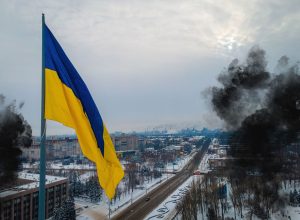A year of Russia’s war in Ukraine – the fallout
Today marks one year since Russia’s invasion of Ukraine ushered in the deaths of thousands of people and the creation of millions of refugees.
The United Nations and NGO Human Rights Watch (HRW) have documented the abuses and crimes committed during the conflict as well as the global impact of the war.
On February 24, 2022, Russia commenced a full-scale military invasion of Ukraine, conducting attacks that have caused civilian deaths and injuries, and damage to civilian buildings, including hospitals, schools, and homes.
HRW says there have been indiscriminate attacks in violation of the laws of war, some of which may amount to war crimes.
“By the end of the first week of hostilities, over a million people in Ukraine had fled their homes, many seeking refuge outside Ukraine,” A HRW report said.
“In Russia, censorship reached new heights as authorities blocked access to multiple independent media sites on the basis of their publications about the war, and major independent outlets closed.
“Thousands of anti-war protesters across Russia were arbitrarily detained during the first week of the war.”
Russia’s war in Ukraine has also wrought a devastating toll on civilians and shattered civilian life in much of the country, Human Rights Watch says.
“Russian forces have committed apparent war crimes and crimes against humanity, including torture, summary executions, and enforced disappearances. They have carried out indiscriminate attacks on civilian areas and repeatedly targeted energy infrastructure, leaving millions of civilians periodically without electricity, water, and heat as winter temperatures plunged, the agency says.” The UN says more than 14 million Ukrainians have been forced to flee their homes.
The UN says more than 14 million Ukrainians have been forced to flee their homes.
Since Russia’s February invasion, the United Nations has reported at least 8,000 civilian deaths and more than 11,000 wounded as a result of the war in Ukraine and estimates the actual figures to be much higher.
Approximately 6.5 million Ukrainians are internally displaced, and about 5 million have fled as refugees to European countries. About 2.8 million Ukrainians are in Russia and Belarus, in some cases against their will.
HRW says Russian forces have killed, arbitrarily detained, tortured, and forcibly disappeared civilians.
Detainees reported beatings, electric shocks, mock executions, and water boarding, among other torture and mistreatment.
Russian forces have also tortured Ukrainian prisoners of war. Russian soldiers held people in degrading conditions in basements, pits, boiler rooms, and factories.
In December 2022, the UN reported that between February 24 and October 21, it had documented 86 cases of sexual violence, most by Russian forces, including rape, gang rape, forced nudity, and forced public stripping in various regions of Ukraine and in one penitentiary facility in Russia.
Also, UN monitors have documented killings and torture of prisoners of war held by Russian forces, including torture leading to death. The UN also documented instances of ill-treatment of Russian prisoners of war held by Ukrainian forces.
HRW says that Russian forces have repeatedly carried out indiscriminate bombing and shelling of civilian areas. These attacks have destroyed and severely damaged homes, businesses, schools, hospitals and other facilities.
More than 2,700 schools and colleges have been damaged, more than 300 beyond repair.
Many of these attacks on civilian areas have been with explosive weapons with wide area affects, including cluster munitions, unguided aerial bombs, and guided missiles, HRW says.
Russian forces also carried out targeted attacks on civilians in vehicles trying to flee hostilities, without any apparent effort to verify whether the occupants were civilians.
Russia’s attacks on Ukraine’s energy infrastructure disrupted access to electricity, heat, and in some cases water services for millions of civilians throughout the country, ahead of and during the cold winter months.
Also, Russian officials have organised the mass and forced transfers of Ukrainians, sometimes against their will or without providing any meaningful choice.
The UN and other human rights organisations have reported the disproportionate impact of the war on people with disabilities and older people.
“Some have been trapped in residential institutions facing enormous risks to their life and health,” a UN report says.
“The UN and human rights and humanitarian aid groups have also highlighted the war’s disproportionate impact on women and girls, including female-headed households, and other marginalised groups,” it says.
The war in Ukraine has also had a broader impact globally, leading to food shortages and rising energy prices.
An International Monetary Fund (IMF) report says the conflict is a major blow to the global economy that will hurt growth and raise prices.
The report says the entire global economy has felt the effects of slower growth and faster inflation, and this has translated into higher levels of poverty and food insecurity, especially in parts of the developing world.
The impacts include higher prices for commodities like food and higher energy prices.
“This has, in turn, eroded the value of incomes… disrupted trade, supply chains, and remittances as well as an historic surge in refugee flows,” the IMF report said.












